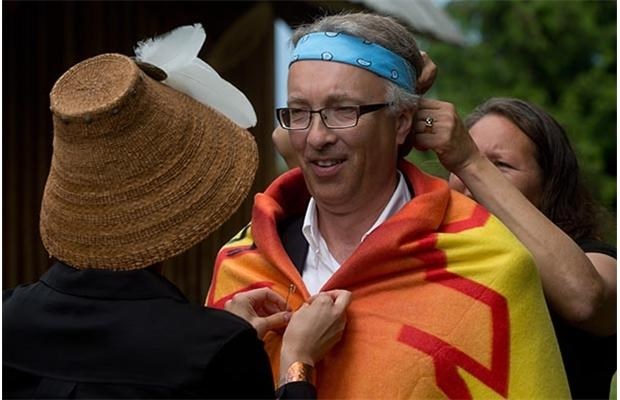
Aboriginal Relations and Reconciliation Minister John Rustad is pictured in this file photo.
Image Credit: THE CANADIAN PRESS/Darryl Dyck
April 03, 2015 - 9:31 AM
VICTORIA - A strong federal commitment to treaty-making in Canada is needed to speed up land-claims deals that move at a glacial pace and cost too much money, especially in British Columbia, said a report released Friday.
The 92-page report by Doug Eyford, who is Prime Minister Stephen Harper's aboriginal envoy, said First Nations across Canada agree the federal government is only willing to meet its minimum legal obligations on the issue, even though an attitude adjustment and major shift in direction is required.
The New Direction report urges the government to get fully engaged in the treaty process and determine what talks should move forward or be abandoned.
Cited as sticking points are institutional barriers, inefficiencies with the process, poor accountability, and a lack of urgency.
"There have been shortcomings in Canada’s efforts to implement modern treaties," said the report. "Higher level oversight is required to ensure all federal departments meet their implementation obligations. Treaty-making has progressed at a glacial pace and at significant cost."
Eyford's report said there have been 26 modern treaties since 1973, another 75 are at various stages of negotiation across Canada, but most are bogged down in bureaucracy or stalled.
The report paid close attention to B.C. where a modern treaty-negotiation process was introduced in 1993 but has only produced four treaties among more than 200 First Nations.
Most B.C. First Nations, with the exception of less than two dozen aboriginal groups, have not signed land-claims treaties. The majority of the treaties date back to the mid-1800s, when B.C. was a colony and Vancouver Island First Nations signed agreements with governor James Douglas.
Eyford said B.C. believed it would have settled most of its treaties by now.
"After more than 20 years of negotiations, it is clear those expectations were overly ambitious if not unrealistic," he said in the report. "Substantial changes are required if treaty-making is to become more effective."
B.C. Premier Christy Clark signalled a change recently when her cabinet refused to approve former Liberal cabinet minister George Abbott as the commissioner who oversees the treaty process.
Clark's Liberals have said they remain committed to reaching land-claims treaties, but in recent years have focused on economic-benefits deals with First Nations that were viewed as pre-treaty side deals.
B.C.'s Aboriginal Relations and Reconciliation Minister John Rustad said in a statement the province welcomes the report and will work with Ottawa and First Nations to improve the process.
"The report confirms what we in B.C. have known for some time: the current treaty process is expensive and takes too long," said Rustad.
"The province agrees we need to find new and innovative ways to achieve lasting reconciliation with First Nations. More than $620 million has been spent in the past 22 years on the treaty process but less than half of B.C. First Nations have been engaged. We can and will do better."
Federal Aboriginal Affairs Minister Bernard Valcourt said in a statement the government is taking action to help make the treaty process more effective.
"Our goal is to work in partnership so we can seize opportunities to promote prosperous communities and economic development for the benefit of all Canadians," he said.
The First Nations Summit, the province's largest aboriginal group, said increased federal commitment is welcome, while the Union of B.C. Indian Chiefs said Eyford's report endorses a failing process.
First Nations Summit spokeswoman Cheryl Casimer said full federal engagement, the imposition of timelines and a closer watch on treaty talks will add needed impetus to the negotiations.
"We're pleased to see Mr. Eyford took the opportunity to incorporate what he heard from B.C. First Nations," she said.
The report said the BC Treaty Commission's current mandate may be too limited, and further reforms should included ways to measure progress and alternative resolution methods if a treaty is not likely.
News from © The Canadian Press, 2015